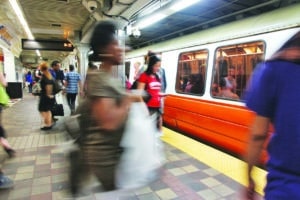The state’s congressional delegation is “furious” about service reductions at the MBTA and plans to have “hard conversations” with transit officials and Gov. Charlie Baker about reversing them, U.S. Rep. Stephen Lynch said Monday, warning that the delegation’s confidence in Baker and Poftak was at risk as Congress gets ready to take up a massive infrastructure spending bill.
Lynch joined Boston Mayor Marty Walsh for a press conference touting the $1.9 trillion spending bill that President Biden signed into law last week, which includes $30 billion in transit funding. Massachusetts is slated to receive more than $1 billion in support of urban transit systems, most of which will go to the MBTA.
Like it has for other transit networks across the country, the T’s ridership plummeted early in the pandemic. Passenger levels remain below their pre-COVID numbers, and the corresponding budget crunch led MBTA overseers to approve a package of money-saving service cuts last December. The MBTA says the cuts will save it $21 million.
‘Hard Discussions’
The latest round of reductions, including lowered trip frequency on subway and bus lines by up to 20 percent and the elimination of nine bus routes, took effect Sunday.
“It is incongruous with our intent, speaking for the delegation, that an agency would take federal support from the taxpayer, and then cut services to those same taxpayers. That doesn’t work for us,” Lynch said. “So we’re going to have some hard discussions with the MBTA and with the governor.”
Lynch also indicated that money for Massachusetts in the Biden administration’s large, planned infrastructure spending bill could be in question “if we don’t have the cooperation and the partnership that we need with our transportation agencies. … I’m hoping they understand the implications of our confidence in them to do the right thing.”
MBTA officials are planning to restore some subway and bus service later this year based on spring demand, targeting an increase in bus service hours from 88 percent of pre-COVID levels in the spring to 90 percent in the summer and then as high as 93 percent in the fall.
Ridership on the Red, Green and Orange subway lines stands at 25 percent or less of its pre-COVID levels, according to the T. The Blue Line is at about 38 percent of pre-pandemic ridership.
‘They’re Going in the Opposite Direction’
Lynch said he has also been in talks with transit officials about a furlough of around 40 conductors by commuter rail operator Keolis.
He said he has talked to other members of the delegation, “and they are furious about this.” The delegation is “in total opposition to the reduction in services, to the laying off of employees and furloughing employees,” Lynch said.
“This is a moment where you might have to absorb a little bit of pain on behalf of the people that you represent,” he said. “I understand the difficulties, I understand where the ridership is right now but the idea is to provide this money to get the ridership where it needs to be over the next weeks and months. This it, this is the beginning of our opening and to get the commonwealth back to business, and what are they doing? They’re cutting bus service. They’re laying off employees. They’re going in the opposite direction of where they need to be going.”
In a radio appearance Monday afternoon, MBTA General Manager Steve Poftak said the cuts will allow the T to adapt to ridership trends coming out of the pandemic, but noted the T itself has not laid off any staff.
“I hear the congressman’s strong objection to what we’ve done, and that’s something we will obviously be talking to the delegation about,” Poftak said on WBUR’s “Radio Boston” show. “But I would say it is in service to stewarding the MBTA through this period where we’ve got a large structural deficit as far as the eye can see, and by prudently conserving this money and spending it to deal with this, it also gives us time to adapt to what is going to be a different type of ridership.”
The MBTA cuts have also caught the attention of some state lawmakers.
Rep. Mike Connolly, a Cambridge Democrat, described them as “a war on public transit” and “unacceptable.”
“We as legislators have the power to direct the Baker Admin. to undo these cuts – and when we take up the [fiscal year 2022] state budget next month, this is something I will look to pursue,” he wrote on Twitter Monday.







